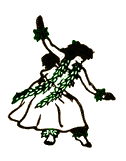|
The
Power
of Words in Hawaiian Songs

Traditional
Hawaiians recognize the
power of words. Words, phrases and metaphors are,
therefore, selected with deliberate care; expressed with great
emotion and repetition, they are capable of acquiring more power
called mana
(a spiritual power or life force, akin to chi or ki
in Asian cultures or prana in India).
The mana
of a prayer, chant, song or hula lies in its emotionality and
its intended, but often concealed, references to a person, place
or thing. Hawaiians have the uncanny ability as lyricists
to weave deep meanings into poetic patterns of words that dance
to the beat of the hula.
Kaona
[pronounced: kao' nah] is the term
used to describe the subtext -- the hidden or veiled
meaning -- which adds to the power and
effect of the words. It is the double entendre of Hawaiian
music, chant and prose, written in a language of poetry, romance
and at times, sassiness.
It is often expressed in richly poetic nature imagery, which serve
as backdrops to express great depths
of feeling, as in Keali`i
Reichel's Kawaipunahele.

Scroll down to the
bottom of this
page to learn about
the kaona of the song, Kawaipunahele.
Words with double (or triple) meanings are often used to bring
good -- or bad -- fortune.
Kaulana
Nâ Pua, for example, is not about famous flowers,
as the literal translation would indicate. Instead, it was
written in 1893 to protest the illegal overthrow of Queen
Lili`uokalani, and it remains a symbol of resistance within the
Hawaiian sovereignty movement today.
Israel
"IZ" Kamakawiwo`ole's Somewhere
Over the Rainbow / What a Wonderful World hit medley
appears to be totally lighthearted and mainstream. So much so
that it is a favorite among the music movers and shakers in the
movie, television and advertising industries. For IZ and
others in Hawai`i, the
subtext reflected pro-sovereignty leanings, as it alluded to the
still-unfulfilled promise to
restore Hawai`i's political sovereignty, stripped away in 1898
when Hawai`i was annexed by the United States government.
Some songs appear to
be innocent enough on the surface. For example, Ka
Uluwehi O Ke Kai by Aunty
Edith Kanaka`ole is about the joys of going to the
ocean and picking limu (seaweed) -- at least on
the surface. The veiled meanings are far more graphic and
intimate. Another example is the innocuously
titled Noho
Paipai ("Rocking Chair Hula"); it is more
about erotic shenanigans than about soothing the little one.
Less uptight and more rascal (kolohe), Hawaiian
songwriters are masters of sexual innuendo. Ah, it's no wonder the
old folks would look sideways and wink at each other, stifling
giggles that sometimes gave way to bus' out laughter!
Hawaiian songwriters
show us that there are gentle
ways to describe a lover by their skillful of metaphors,
capable of conveying multiple levels of meaning.
In short, learning Hawaiian
allows a greater insight into the song via the subtleties and
delicate nuances of the language. The vividness of the
word pictures of the people and the places are enhanced, giving
the listener the means to visit and more fully experience that
time and place via the mind's eye.

It is my hope that the translations of the Hawaiian lyrics into
English will add meaningfulness to the songs and hula for the
members of the club. Hardly an
expert, I've also included my best efforts in phonetic syllabication
of the sometimes challenging pronunciation of Hawaiian words.
As
Hawaiian culture proponents, we are grateful for the club's
enthusiastic participation in the perpetuation of Hawaiian
music, dance, and language, while having the time of our lives!
Looking
forward to many years together of celebrating life with Hawaiian
songs and the hula with Da' Hawai`i Club, this is my sincere
wish:
With
their meaningful and heartfelt singing and dancing, the
members of Da' Hawai`i Club -- and especially the
dancers, singers and musicians of Hâlau o Nâ Kûpuna
who "practice, practice, practice" while
having go-o-o-od fun -- will fully absorb all that good,
life-giving mana.
~Aunty D
© 2002
Aunty
D
This is a not-for-profit site. Materials on this site are
used for personal, non-commercial and educational purposes only.
If you do not wish your face, name, words, lyrics, or
picture/graphic to grace the pages of this site, no huhû.
Simply e-mail
and request its removal. No offense is ever intended
here -- only Aloha.
Disclaimer
|